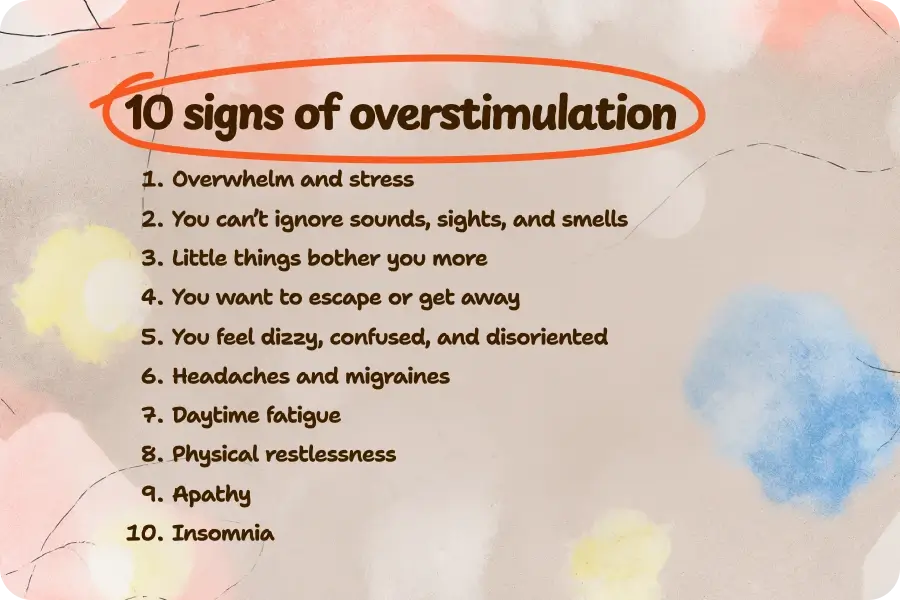Have you ever felt overwhelming sensations, like your brain suddenly lost the ability to process your surroundings? This cognitive overload can be overstimulation.
This guide identifies the specific signs of overstimulation in adults and provides straightforward methods to reduce sensory overload in everyday life.
Wondering whether you have sensory processing differences due to ADHD? Take a test to find out.
What does “overstimulated” mean?
Overstimulation is a stress response that happens when your nervous system takes in more sensory input or emotional data than it can process. For most people, it feels like an invisible “limit” has been reached. It makes it impossible to handle even one more sound, physical touch, or everyday task.
According to research, overstimulation occurs when your amygdala (the brain’s alarm system) perceives the environment as “too much” and signals the body to enter a mild fight-or-flight response.
Mary Hoang, the psychologist, says it’s because “The brain is programmed to pay attention to stimuli that are changing quickly, so we are often at the mercy of the ‘endless scroll’ and TV screens.”
10 signs of overstimulation in adults
- You can’t ignore loud sounds and smells. These are the very first to trigger overstimulation and anxiety episodes. Car honking, construction noises, flickering fluorescent lights, and loud music in crowded cafes feel stressful.
- You experience overwhelm. You feel like you can’t relax, and everything seems urgent. You also get the overwhelming feeling that you’re behind on deadlines, even though that’s not true.
- You want to escape or get away and dream of quiet solitude in a peaceful place.
- Scratchy clothing tags, tight waistbands, or fluctuating room temperatures may cause you physical discomfort.
- You feel dizzy or disoriented. The room might spin, your thoughts might feel foggy, you might have trouble remembering simple things, and you may even have panic attacks.
- You experience pain in your body. Persistent headaches, migraines, nausea, and muscle tension can result from excessive sensory input.
- You feel daytime fatigue. Even with adequate sleep hours, you might wake up tired. It may indicate that your brain struggles to process overwhelming stimuli.
- You’re physically restless. You may experience a constant need to move or fidget as your body tries to process the excessive stimulation.
- You feel apathy and may find yourself indifferent towards things that used to excite you, which can be the result of sensory processing sensitivity.
- You experience sleep deprivation. Racing thoughts can make it impossible to fall asleep and rest.

How overstimulation affects people with mental health conditions: physical symptoms & common triggers
Anyone can experience sensory processing issues, regardless of their mental health state. However, sensory sensitivity can also be even more common in people with mental health conditions like ADHD, autism spectrum disorder (ASD), PTSD, or personality traits like heightened sensitivity.
ADHD & Overstimulation
The thing is that the areas of the brain responsible for focus, decision-making, and impulse control may function differently in people with ADHD. It makes managing emotions and external stimulation difficult for them and causes ADHD burnout.
That’s why, to manage overstimulation effectively, people with ADHD may need to know their common sensory triggers:
- Loud or sudden noises.
- Strong or unfamiliar tastes and textures in food.
- Certain textures or touches.
- Bright lights or busy places.
- Specific intense smells.
Overstimulation in ASD
When a person with ASD hits a saturation point, the body enters a survival state driven by adrenaline. They may experience the “brain fog,” become unresponsive, or extremely irritable. At the same time, they may show increased “stimming” (repetitive movements) as the body tries to process the extra energy.
Overstimulation in ASD often stems from an inability to “predict” or “filter” the environment:
- Overlapping conversations.
- Unexpected changes in routine or “transition gaps” (moving from one activity to another).
- The mental effort of trying to appear neurotypical, which drains the brain’s battery faster than the environment itself.
Overstimulation in HSP
Because the brain of a person with sensory sensitivity is wired with a more permeable “sensory filter,” it processes environmental data with a depth and intensity that others simply do not experience. High sensitivity people (HSPs) have an active mirror neuron system, meaning they don’t just observe others—they “echo” their emotions.
These are the small things that slowly drain an HSP’s “battery” throughout the day, causing sensory overload:
- Intense social interactions. As HSPs are highly empathic, they usually track people’s body language and tone of voice. That’s why entering a room full of tension, even if no one is speaking, can be exhausting for them.
- Moving from one social commitment to another without a “reset” period may lead to emotional burnout in HSPs. They may also experience small-talk fatigue.
- Because HSPs process information deeply, they may fall into the trap of overthinking and “analysis paralysis.” Their brain explores every possible outcome and its emotional impact on others. The desire to make the “perfect” choice to avoid conflict or failure creates intense internal pressure.
- Loud noises, bright lights, and information overload can also drain and overstimulate HSPs.
- Multi-tasking. Switching between tabs, answering texts while working, and having a TV on in the background creates a fragmented attention span.
- Being watched while working or having a strict time limit triggers the amygdala, making even simple tasks feel like high-stakes survival situations.
- Doomscrolling and social media overdose are part of your day-to-day life. Researching a topic too deeply or consuming too much news can lead to a “mental jam” where the brain stops being able to prioritize what matters. According to research, online news causes more emotional stress than printed news or TV and can lead to anxiety disorders or depression.
PTSD & Overstimulation
Triggers can cause a trauma survivor to experience a physical “flashback,” even if their mind isn’t visualizing a traumatic memory. The physical symptoms usually include cold sweats, the feeling of “electric shock” in the body, dissociation, chronic jaw clenching, and digestive upset.
Here are the triggers linked to a past trauma:
- A specific smell (diesel, a certain perfume), a sudden loud bang, or even a particular tone of voice.
- Being in a crowded space where exits are blocked or having someone stand too closely behind you.
- Confrontation with other people or even perceived disapproval.
- Situations where you feel out of control.
Managing overstimulation: 6 tips for everyone who feels overstimulated
To address overstimulation and reduce sensory input, you may use effective coping strategies, deep breathing, and relaxation techniques. Tools and tips are here to help.
1. Reduce the “data stream”
- Turn off notifications and put your phone in another room. The blue light and unpredictable pings keep your brain in a state of high-alert multitasking.
- Sit in a dark room with noise-canceling headphones for 10 minutes. This allows your thalamus to stop sorting data.
2. Reduce your energy level through physical activity
- Deep sensory experiences. Firm, steady pressure—like a heavy blanket or a firm hug—signals the brain to release serotonin.
- Stand up and gently shake your hands, then your arms, then your legs.
Cimone Safilian, PhD, TLLP, added her advice on how to reduce overstimulation
“Reducing overstimulation is all about finding what works best for you! Experimenting with these tips and figuring out what works best and makes you feel your best is key. Another helpful tip is establishing a calming night time routine. Something that you can do every night, that is relaxing, and is something that you look forward to at the end of a long day. This can be lighting your favorite candle while getting ready for bed, dedicating 30 minutes before sleep to reading your favorite book, or sticking to a night time skin care routine. It doesn’t have to be complicated, it just needs to be simple and relaxing!”
3. Use grounding techniques
- Deep breathing exercises. Breathe in for four seconds, but breathe out for eight. Long, slow exhales stimulate the vagus nerve, which acts as a brake for your nervous system, manually lowering your heart rate and production of stress hormones.
- Try getting outside. Go to your favorite park or other place and find a quiet corner where you can just sit and be present in the moment.
- The buffer rule. After an episode of overstimulation, give yourself a 15-minute “buffer zone” of low-intensity activity, such as listening to brown noise or doing a repetitive task like folding laundry.
4. Fix “Time blindness”
Overstimulation may happen because the brain loses its sense of time. This, in turn, makes every task feel like it’s happening “all at once.”
- Visual timers. Use an analog clock or a “red disk” timer. Seeing time as a physical, shrinking shape is much easier for an overstimulated brain to process than digital numbers.
- The “Now vs. not now” list. When overwhelmed, write down everything on your mind. Then, physically cross out everything that doesn’t need to happen in the next 60 minutes. This narrows your perceptual field to a manageable size.
You can also use Breeze to write down your feelings, triggers, and reactions daily. Unlike traditional journaling, which can feel time-consuming or formal, Breeze journaling focuses on quick, honest reflections about your thoughts, emotional skills, and daily experiences. Self-reflection prompts in the app may help you better understand your feelings and needs and improve self-management.
5. Learn to set boundaries
If you live with others, let them know you need quiet time. You can say, “Can I have an hour in my room?” or “Could we all have a quiet dinner tonight?” It’s okay to ask for these things.
6. Reach out to a mental health professional
While self-help strategies are effective for immediate relief, persistent sensory overload may require a more structured approach. Different types of therapy can help you identify the underlying mechanisms of your stress response, whether it stems from neurodivergence, anxiety, or a sensitized nervous system. By working with a specialist, you can develop targeted sensory-based interventions—such as customized grounding routines or environmental modifications—that go beyond quick fixes.
Quick Resets Cheat Sheet
| Sensation | The “reset” tool | Why it works |
| “Buzzy” or anxious | Weighted blanket | Deep pressure lowers cortisol. |
| Raging or irritable | Cold water splash / Ice cube | It tells the amygdala that the “threat” is over, stopping the production of adrenaline almost immediately. |
| Foggy or dissociated | Strong scents (peppermint/lemon) | Forces the brain to focus on the “now.” |
| System crash | Total darkness/silence | Gives the thalamus a “processing break.” |
8 Tips to address sensory and perceptual alterations in ADHD, AuDHD, and ASD
- Low-stimulation “safe zones”. Designate one area in your home (even just a corner) with soft lighting, neutral colors, and no electronics. Spend 10 minutes there when you feel the “buzzing” sensation of overstimulation.
- Visual de-cluttering. ADHD and AuDHD brains often experience “visual noise” as physical weight. Use closed storage (bins with lids) to hide clutter. If you can’t see the mess, your brain doesn’t have to process it as a “task.”
- Auditory barriers. Use noise-canceling headphones or “loops” (earplugs that filter decibels but allow conversation) to reduce the sheer volume of the world.
- Resistance exercises. Pushing against a wall, doing “chair push-ups,” or squeezing a high-resistance stress ball provides intense sensory data that helps the brain “locate” the body again.
- The 5-minute buffer. Before entering a high-stimulus environment, sit in your car or a bathroom stall for five minutes in silence.
- The “HALT” check for biological regulation. Before assuming you are having a sensory meltdown, check: Am I Hungry, Angry, Lonely, or Tired? Sensory input is usually the first way the ADHD brain signals that it needs food or sleep.
- Routines. Predictable schedules reduce stress and communication needs.
- Silence. Breaks from noise are vital for feeling relaxed and thinking clearly.
4 Tips for PTSD overstimulation
Because PTSD overstimulation lives in the body, sensory-based interventions can “prove” to the brain that you are safe in the present moment:
- Stand and push against a wall with all your strength for 30 seconds.
- Temperature shift. Splash freezing water on your face. According to research, this triggers the mammalian dive reflex, which automatically lowers your heart rate and signals the amygdala to stand down.
- The “vagus nerve” reset. Place a cold compress on your chest or sing/hum loudly.
- Oral regulation. Chewing on something crunchy (carrots/ice) or sipping a thick smoothie through a straw provides intense sensory feedback that can help “anchor” a racing mind.
4 Tips for HSPs’ overstimulation
Highly sensitive people need calm and simplicity to handle lots of sensory input:
- Low-frequency sound. Use brown noise or pink noise rather than white noise. These lower frequencies are less “sharp” and can create an auditory cocoon that masks intrusive sounds without adding extra stress to the ears.
- The “micro-darkness” break. If you cannot leave a room, simply closing your eyes for 60 seconds can reduce your brain’s processing load by up to 80%.
- The “shielding” visualization. When in a crowd, mentally visualize a physical barrier between your energy and others. While this approach sounds abstract, it helps the brain establish a psychological boundary, reducing the “fawn” response and the subconscious urge to monitor everyone’s emotions.
- Somatic anchoring. Touch something with a distinct texture, like a smooth stone or a piece of jewelry. Focusing on a single, neutral physical sensation can “pull” your awareness out of the emotional cloud and back into your body.
Also, you can take a gentle step towards calm with the Breeze app. It isn’t a replacement for a mental health professional’s help, but can be a friendly companion on your journey to feeling more in control. You will be able to:
- Track your moods to identify what’s causing the overload.
- Challenge negative thinking patterns.
- Take in-depth tests to understand your personality and strengths.
- Access personalized routines based on your needs.
Frequently asked questions
1. Is feeling overstimulated normal?
Yes, but the intensity varies. For most, it’s a temporary annoyance. It happens when your brain receives more sensory information (noise, light, tasks) than it can process at once.
2. What does overstimulation feel like?
You might experience:
- An urgent, desperate need to be alone or in the dark.
- Panic feelings or sudden irritability over minor inconveniences.
- A physical “buzzing” or vibrating sensation under the skin.
- Difficulty concentrating. You can’t effectively process what people are saying, even if you can hear them.
3. Why do I get overstimulated so easily?
It usually comes down to a lack of “protective filters.” When you grow up in an unsafe home, you have to be aware of everything, like the sound of a key in the lock, the mood in the kitchen, and the tone of a parent’s voice. Your brain never learned how to tune out irrelevant noise because, in your past, everything mattered for survival.
Sources
- Scheydt S, Müller Staub M, Frauenfelder F, Nielsen GH, Behrens J, Needham I. Sensory overload: A concept analysis. April 2017
- Miao Chao, Dini Xue, Tour Liu, Haibo Yang, Brian J. Hall. Media use and acute psychological outcomes during COVID-19 outbreak in China. August 2020
- Miller LJ, Schoen SA, Mulligan S, Sullivan J. Identification of Sensory Processing and Integration Symptom Clusters: A Preliminary Study. November 2017
Disclaimer
This article is for general informative and self-discovery purposes only. It should not replace expert guidance from professionals.
Any action you take in response to the information in this article, whether directly or indirectly, is solely your responsibility and is done at your own risk. Breeze content team and its mental health experts disclaim any liability, loss, or risk, personal, professional, or otherwise, which may result from the use and/or application of any content.
Always consult your doctor or other certified health practitioner with any medical questions or concerns
Breeze articles exclusively cite trusted sources, such as academic research institutions and medical associations, including research and studies from PubMed, ResearchGate, or similar databases. Examine our subject-matter editors and editorial process to see how we verify facts and maintain the accuracy, reliability, and trustworthiness of our material.
Was this article helpful?






